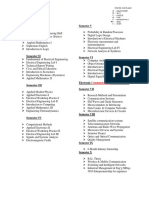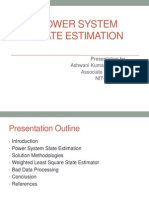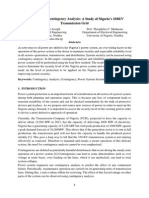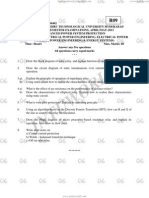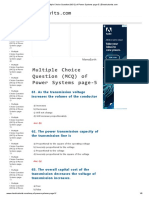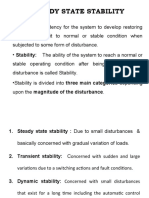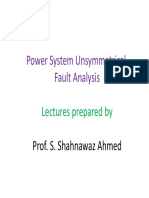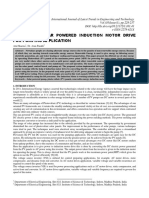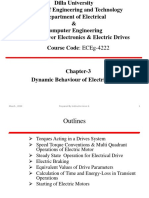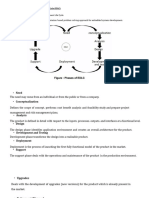100%(3)100% found this document useful (3 votes)
1K viewsCourse Title of Computer Applications in Power Systems
This document provides information on the course "Computer Applications in Power Systems" including the course code, instructor, prerequisites, description, objectives, topics, teaching methodology, assessment, and references. The course introduces computer modeling and simulations for load flow analysis, fault studies, power system stability, harmonic propagation, and optimization in power systems. It aims to help students understand SCADA, online applications, computer-aided protection, and applications of DSP to power system protection. The course is assessed through continuous assessments and a final exam.
Uploaded by
ollata kalanoCopyright
© © All Rights Reserved
Available Formats
Download as DOCX, PDF, TXT or read online on Scribd
100%(3)100% found this document useful (3 votes)
1K viewsCourse Title of Computer Applications in Power Systems
This document provides information on the course "Computer Applications in Power Systems" including the course code, instructor, prerequisites, description, objectives, topics, teaching methodology, assessment, and references. The course introduces computer modeling and simulations for load flow analysis, fault studies, power system stability, harmonic propagation, and optimization in power systems. It aims to help students understand SCADA, online applications, computer-aided protection, and applications of DSP to power system protection. The course is assessed through continuous assessments and a final exam.
Uploaded by
ollata kalanoCopyright
© © All Rights Reserved
Available Formats
Download as DOCX, PDF, TXT or read online on Scribd
You are on page 1/ 2
Dilla University
Collage of Engineering and Technology
School of Electrical & Computer Engineering
Course Title: Computer Applications in Power Systems Module Number: 22
Course Code: ECEg5252 Course Instructor: Dr. C.V.V Pavani
Degree Program: B.Sc. in Electrical Engineering ECTS: 5
Module Name: Electrical Machines and Drives Electrical Power: V Year
Prerequisites: ECEg4221: Power Systems Year/Semester: IV/II
Course Description: This course introduces computer applications in powers systems and
covers the modelling and simulations of Load flow Analysis, Fault Studies, Power system
stability, Analysis of Harmonic Propagation, Optimization and security in power systems.
Course Objectives:
After completion of the course students will be able to:
- Understand Supervisory Control and Data Acquisition (SCADA) system
- Understand on-line and real-time applications of computers system voltage and excitation control,
automatic generation control (AGC) and economic dispatch control
- Gain insight into computer aided protection and application of DSP to protection of power
systems
Topic/Subtopic/Chapte:
1. Introduction: Computers in Power Systems; Computer Tasks; Automatic Generation
Control; Generation Scheduling; Security Assessment; Optimal Power Flow; Transmission
System Development; Interactive Power System Analysis
2. Load flow Analysis: Network Modeling; Basic Nodal Method; Power system matrix; Fast
decouple power flow
3. Fault Studies: Analysis of three-phase faults; Admittance Matrix Equation; Impedance
Matrix Equation; Fault Calculations; Analysis of Unbalanced Faults; Admittance Matrices;
Fault Calculations; Short-circuit Faults; Open-circuit Faults; Program Description and
Typical Solutions
4. Power system stability modeling: Introduction; Basic model of Synchronous machine;
Synchronous machine Automatic controller Loads; Transmission network; Induction
machine; AC DC conversion; Relays; Unbalaced Faults
5. Analysis of Harmonic Propagation: Transmission line models; Transformer model;
Application of the harmonic penetration algorithm
Dilla University
Collage of Engineering and Technology
School of Electrical & Computer Engineering
6. Optimization and security: Formulation of the optimization problem; Conditions for
minimization; Sensitivity of the objective function; Security assessment
Teaching Methodology: Lectures supported by tutorials and Laboratory exercises
Assessment Methods:
Continuous Assessment……………..50%
Final Exam………………………….50%
Course Policies:
All students are expected to abide by the code of conduct of students throughout this course.
Academic dishonesty, including cheating, fabrication, and plagiarism will not be tolerated.
Students are required to submit and present the assignments provided according to the time
table indicated.
80% of class attendance is mandatory! Please try to be on time for class. Students will not
allow entering if late more than five minutes.
Active participation in class is essential
Cell phones MUST be turned off before entering the class.
References
1. A. K. Mahalanabis, D. P. Kothari and S. I. Ahson, Computer Aided Power System
Analysis and Control, Tata McGraw-Hill, New Delhi, 1988.
2. Mohammad Shahidehpour, Yaoyu Wang, Communication and Control in Electric Power
Systems: Applications of Parallel and Distributed Processing, Wiley-IEEE Press, 2003.
3. P. Kundur, Power System Stability and Control, McGraw Hill Inc., New York, 1995.
4. A. G. Phadke and J.S. Thorp, Computer Relaying Power Systems, John Wiley & Sons, New
York, 1988
5. Selected papers from IEEE Computer Applications in Power
6. Software Manual
Approved By:
__________ __________
Name (Course instructor) Signature Signature Date
________ __________
Name (Module Coordinator) Signature Signature Date
You might also like
- Dokumen - Tips Siwes It Report On Web Design100% (3)Dokumen - Tips Siwes It Report On Web Design54 pages
- ECEG-6306 - : Power System Planning and Management100% (1)ECEG-6306 - : Power System Planning and Management21 pages
- Eee-Viii-Power System Operation and Control (10ee82) - Notes PDF81% (21)Eee-Viii-Power System Operation and Control (10ee82) - Notes PDF130 pages
- FORTIGATE - Identity - FSSO - Installation and ConfigurationNo ratings yetFORTIGATE - Identity - FSSO - Installation and Configuration14 pages
- Voltage Profile Improvement and Loss Minimization in A Transmission Line Using Fuzzy Logic Based Unified Power Flow Controller (UPFC) ProposalNo ratings yetVoltage Profile Improvement and Loss Minimization in A Transmission Line Using Fuzzy Logic Based Unified Power Flow Controller (UPFC) Proposal16 pages
- Hawassa University: School of Electrical and Computer (Power Stream) EngineeringNo ratings yetHawassa University: School of Electrical and Computer (Power Stream) Engineering39 pages
- Bahir Dar University Bahir Dar Institute of Technology: Faculty of Electrical and Computer Engineering Final Thesis100% (1)Bahir Dar University Bahir Dar Institute of Technology: Faculty of Electrical and Computer Engineering Final Thesis59 pages
- 1 - Introduction To Power System AutomationNo ratings yet1 - Introduction To Power System Automation6 pages
- Powersystemanalysis-Short Questions With Answers PDF100% (2)Powersystemanalysis-Short Questions With Answers PDF35 pages
- 17417-Transmission and Distribution of Electrical PowerNo ratings yet17417-Transmission and Distribution of Electrical Power10 pages
- Adigrat University: Advisor Name: Ins: G/Medhin GNo ratings yetAdigrat University: Advisor Name: Ins: G/Medhin G35 pages
- Voltage Stability With The Help of STATCOMNo ratings yetVoltage Stability With The Help of STATCOM6 pages
- Power System Analysis and Design Using PNo ratings yetPower System Analysis and Design Using P84 pages
- EE5702R Advanced Power System Analysis:: Power System Control INo ratings yetEE5702R Advanced Power System Analysis:: Power System Control I75 pages
- Introduction To Power Systems (Eceg-3176) : Addis Ababa University Addis Ababa Institute of Technology (Aait)No ratings yetIntroduction To Power Systems (Eceg-3176) : Addis Ababa University Addis Ababa Institute of Technology (Aait)38 pages
- Chapter 3-Power Flow Solution-Gauss Seidel 2100% (2)Chapter 3-Power Flow Solution-Gauss Seidel 232 pages
- Power System Analysis and Simulation Question Paper100% (1)Power System Analysis and Simulation Question Paper2 pages
- Multiple Choice Question (MCQ) of Power Systems Page-5No ratings yetMultiple Choice Question (MCQ) of Power Systems Page-53 pages
- Chapter Two: Representation of Power System ComponentsNo ratings yetChapter Two: Representation of Power System Components24 pages
- Reliability of Distribution System With Distributed Generation Using ETAP PDFNo ratings yetReliability of Distribution System With Distributed Generation Using ETAP PDF8 pages
- Chapter One 1.1 Background of The Study: Research Proposal On Power Quality Enhancement Using DSTATCOM100% (1)Chapter One 1.1 Background of The Study: Research Proposal On Power Quality Enhancement Using DSTATCOM11 pages
- Jimma University Jimma Institute of Technology Faculty of Electrical and Computer Engineering Power Stream0% (1)Jimma University Jimma Institute of Technology Faculty of Electrical and Computer Engineering Power Stream46 pages
- Simulation of Some Power System, Control System and Power Electronics Case Studies Using Matlab and PowerWorld SimulatorFrom EverandSimulation of Some Power System, Control System and Power Electronics Case Studies Using Matlab and PowerWorld SimulatorNo ratings yet
- Haramaya University Haramaya Institute of Technology Department of Electrical and Computer EngineeringNo ratings yetHaramaya University Haramaya Institute of Technology Department of Electrical and Computer Engineering3 pages
- Course Outline - Learning Outcomes and Assessment SchemeNo ratings yetCourse Outline - Learning Outcomes and Assessment Scheme2 pages
- ME01000131 Computer Techniques in Power SystemNo ratings yetME01000131 Computer Techniques in Power System4 pages
- Design of Solar Powered Induction Motor Drive For Pumping ApplicationNo ratings yetDesign of Solar Powered Induction Motor Drive For Pumping Application10 pages
- Homework Assignment #1 Basic Converter Analysis Due at 10 Am MDT On Friday, September 7, 2017No ratings yetHomework Assignment #1 Basic Converter Analysis Due at 10 Am MDT On Friday, September 7, 20173 pages
- Labvolt Series 9063: Data Acquisition and Control Interface0% (1)Labvolt Series 9063: Data Acquisition and Control Interface2 pages
- Ee432 Power Electronics: Dr. Ali M. Eltamaly King Saud UniversityNo ratings yetEe432 Power Electronics: Dr. Ali M. Eltamaly King Saud University79 pages
- Lecture Notes Electrical Machines IV Code: CECE437 Level: Four Points: 100 25+15+60No ratings yetLecture Notes Electrical Machines IV Code: CECE437 Level: Four Points: 100 25+15+6015 pages
- Course Title of Energy Conversion and Rural Electrification100% (1)Course Title of Energy Conversion and Rural Electrification2 pages
- From Several Sources To Be Routed Onto A Single LineNo ratings yetFrom Several Sources To Be Routed Onto A Single Line17 pages
- Measurement and Calculation of Harmonics in Distribution Power System With Connected Small Co-Generation Facility EtanNo ratings yetMeasurement and Calculation of Harmonics in Distribution Power System With Connected Small Co-Generation Facility Etan4 pages
- Determination of PV Generator I-V/P-V Characteristic Curves Using A DC-DC Converter Controlled by A Virtual InstrumentNo ratings yetDetermination of PV Generator I-V/P-V Characteristic Curves Using A DC-DC Converter Controlled by A Virtual Instrument15 pages
- Modelling of A Photovoltaic Panel Based On Their Actual MeasurementsNo ratings yetModelling of A Photovoltaic Panel Based On Their Actual Measurements5 pages
- Modeling and Simulation of Wind-PV Hybrid Power System Using MATLAB/SimulinkNo ratings yetModeling and Simulation of Wind-PV Hybrid Power System Using MATLAB/Simulink4 pages
- Plagiarism Checker X Originality Report: Similarity Found: 0%No ratings yetPlagiarism Checker X Originality Report: Similarity Found: 0%2 pages
- Feasibility Study of Solar Photovoltaic (PV) Energy Systems For Rural Villages of Ethiopian Somali Region (A Case Study of Jigjiga Zone)No ratings yetFeasibility Study of Solar Photovoltaic (PV) Energy Systems For Rural Villages of Ethiopian Somali Region (A Case Study of Jigjiga Zone)7 pages
- Embedded Product Development Life Cycle (EDLC)No ratings yetEmbedded Product Development Life Cycle (EDLC)9 pages
- Information Security Manual Standard 27002 IsoNo ratings yetInformation Security Manual Standard 27002 Iso129 pages
- CELLC BlackSTB ManualFirmwareUpdateProcedureNo ratings yetCELLC BlackSTB ManualFirmwareUpdateProcedure6 pages






















